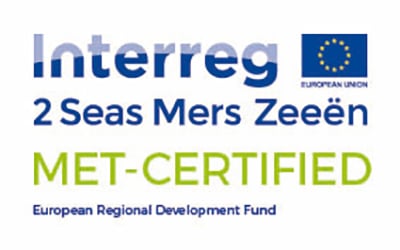Development of International Standards and Certification schemes for Marine Energy Technologies.

Scope:
Marine Energy Technology(MET) Certified aims to accelerate the adoption of insurable and bankable marine energy technologies. This is done by advancing internationally recognised standards and certification schemes under the International Electrotechnical Commission(IEC) and by applying them in eight test and verification cases.
The project consists of 10 Partners and 13 observers and a budget of EUR10M. The project is expected to be completed by the end of 2020.
Operational area:
Activities related to the delivery of the the project goals are primarily focussed in the 2SEAS region (the Netherlands, Belgium, France and England). However, the impact of work done will be felt globally, for example, in the development of international standards for the IEC.
Objective:
This project brings together stakeholders across the 2SEAS region in a coordinated effort to demonstrate the first internationally recognised certified tidal power technologies for both floating and dam integrated markets in the 2SEAS region by 2020. The expected result of the project is increased adoption of insurable and therefore bankable tidal power project arrays in the 2SEAS region and beyond.
Additionally, existing networks will be connected and reinforced through this project dealing with policy, governance, SMEs, supply chain, technology and environment in the field of marine energy.
Project outputs:
The development of international standards related to marine energy systems include generic standards as well as bespoke ones for Wave, Tidal, Rivers and Offshore Thermal Energy Converters (OTEC). Related work includes the following:
- The publication of seven international standards & three certification schemes
- Pilot testing the certification process in three marine environments: Submerged (UK), Dam-integrated (UK/NL) and Floating (UK/NL)
- Five scale tests under controlled conditions (FR)
- Demonstration of 1800kW tidal power plant (NL)
- Promotion of best practices gathered from international Open-Water Test Centres
- Marine Innovation Site North Sea (BE)
- Barriers and bottlenecks to market uptake (EU)
- Stakeholder events on certification (EU)
- Roadmap for innovation and business development
Partners:
Classification Societies:
- Lloyd's Register, UK
- DNV GL, UK
Standardisation bodies:
- Dutch Standardisation Institute (NEN). Netherlands
Accredited Test Facilities and Consultants:
- Dutch Marine Energy Centre (DMEC), Netherlands
- European Marine Energy Centre (EMEC), UK
- Ifremer, France
- Perpetuus Tidal Energy Centre (PTEC), UK
- University of Ghent, Belgium
Industries:
- Tocardo Solutions BV, Netherlands
- POM, Belgium
Observers:
- Bureau Veritas, France
- Ocean Energy Europe
- Sustainable Marine Energy, UK
- Marine Offshore Renewables, UK
- France Energies Marine, France
- Exceedence, UK
- Wave Hub, UK
- EWA, Netherlands
- EEL Energy, France
- TU Delft, Netherlands
- Ocean Energy Systems, Portugal
- Innovation Quarter, Netherlands
- GICAN, France
- IEC, Switzerland
LR's role:
Lloyd's Register has been in the forefront of qualifying and certifying marine technologies for over 250 years. Lloyd's Register continues to retain its competency at the cutting edge of marine technology. Since 2007, Lloyd's Register has been engaged with the development of international standards and guidance for marine renewable technologies, initially with EMEC and more recently through the IEC and certification schemes through IEC for renewable energy (IECRE).
More information can be found at:
- https://www.iecre.org/sectors/marine-energy
- https://www.iec.ch/dyn/www/f?p=103:14:15634657290940::::FSP_ORG_ID:22791
With respect to this project, Lloyd's Register's has the following roles:
- To act as an independent certifying body and provide an independent assessment for technologies considered to be part of this project.
- To assist in the publication of the IEC62600-4 technical specification for Technology Qualification as applicable to marine energy technologies.
- To lead the development of an Operational Document (OD) which provides details on the practice of IEC62600-4.
- To run technology qualification assessment projects for projects within the remit of marine energy technologies and update the IEC62600-4 technical specification based upon lessons learned.
- To complement knowledge and contribute towards the publication of other technical standards, e.g. IEC62600-2, IEC62600-3, etc.
- To act as convenor for the IECRE WG-360 group tasked with the development of multiple operational documents related to the practice of IEC standards being developed for marine energy technologies.
- To promote marine energy standards being developed at national and international events, within and ouot with the 2SEAS region.





